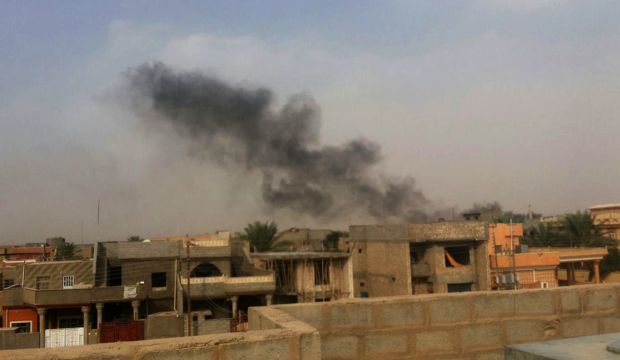
Smoke plumes are visible over buildings in the Iraqi town of Hit, in western Anbar province, 85 miles (140 km) west of Baghdad.
(AP Photo)
Baghdad, Asharq Al-Awsat—The government is not doing enough to help Iraq’s restive western Anbar province against the Islamic State of Iraq and Syria (ISIS), a prominent Anbar tribal chief told Asharq Al-Awsat.
Dulaim tribal chief Majid Al-Ali Al-Suleiman said: “We are no longer in a position to wait on new promises that do not materialize on the ground, like previous promises [from the government].”
Suleiman made the comments just days after he told Asharq Al-Awsat that the Iraqi government, led by new prime minister Haider Al-Abadi, had promised to train and arm 30,000 Anbar tribal fighters to participate in the ongoing battle against ISIS.
ISIS fighters are battling government troops—backed by volunteer militias—in a number of regions of the country, however Anbar remains a stronghold for the group with large parts of the province under ISIS control. Although many Anbar tribes had initially backed ISIS against the Maliki government’s perceived sectarian policies, the appointment of Haider Al-Abadi as prime minister has seen a number of tribes switch their allegiance to the new unity government in Baghdad.
“Abadi agreed to the request that I and other Anbar tribal sheikhs made to recruit 30,000 tribal fighters as part of the military apparatus under the authority of the Ministry of Defense. We do not care what this force is called, so long as it is not called a Sahwa (Awakening) force because it is not as if we are sleeping and need to wake [to face this threat],” the Dulaim tribal chief told Asharq Al-Awsat.
“What happened during the Sahwa era was a tragedy in itself due to the lies and deceptions practiced on the people of Anbar by those who formed these militias but did not do anything for the people of the province,” Suleiman said in reference to the Sahwa forces that had been formed to combat Al-Qaeda’s presence in Iraq in 2006. Many of the Sunni tribal fighters who participated in the Sahwa movement subsequently backed ISIS having been angered by the increasingly sectarian policies of the Shi’ite-led Maliki government and perceived negligence of Iraq’s Sunni provinces, particularly the Anbar and Salah Al-Din governorates.
In previous comments, Suleiman had called this 30,000-strong Anbar tribal force a Hashd Watani or ‘national mobilization’ force. For the first time, he revealed details of how it will be formed, confirming that each Anbar tribal chief will send a certain number of fighters who will all then receive joint military training.
“The most important thing is for this new force to be under the umbrella of the Ministry of Defense so that it is not an addition to the existing militias on the ground which remains one of the causes for the tragic situation that we are witnessing in Iraq,” he said.
“The people of the region are the most capable of defending and protecting it, so long as they receive the right training and arms,” he added, issuing a new call for Baghdad to provide Anbar tribesman with arms to fight ISIS.
The Dulaim tribal chief also criticized international efforts to combat ISIS after meeting with US anti-ISIS envoy General John Allen in Amman this week. “The problem is that, until now, the international forces do not seem serious in their confrontation of ISIS [and] their airstrikes are selective and ineffective,” he said.
“If the international alliance was half as serious as it says it is in its confrontation of ISIS, the group would not have been able to secure the victories that it has, particularly in the most recent period,” he added.
